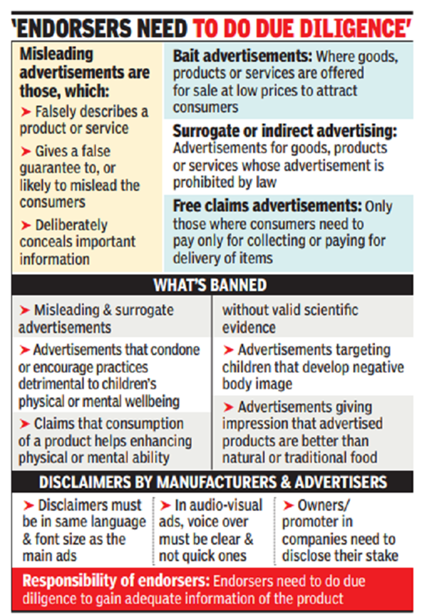In News:
- To protect people from being exploited or affected by misleading advertisements, the Central Consumer Protection Authority (CCPA) has notified new guidelines for stopping them across all platforms — regardless of form, format or medium – and has put a complete ban on surrogate advertising.
What’s in today’s article:
- About CCPA (Mandate, Powers, Functions, Consumer Protection Act 2019)
- News Summary (CCPA Guidelines 2022)
About Central Consumer Protection Authority (CCPA):
- The CCPA is a statutory body constituted under Section 10 of the Consumer Protection Act, 2019.
- Mandate: To protect the rights of the consumer by cracking down on unfair trade practices, and false and misleading advertisements that are detrimental to the interests of the public and consumers.
- Concerned Ministry: Ministry of Consumer Affairs, Food and Public Distribution
Powers & Functions of CCPA:
- To recall goods or withdrawal of services that are “dangerous, hazardous or unsafe”;
- Pass an order for refund the prices of goods or services so recalled to purchasers of such goods or services;
- Discontinuation of practices which are unfair and prejudicial to consumer’s interest;
- Impose penalties on manufacturers/endorsers/publishers of misleading advertisements.
Consumer Protection Act, 2019:
- The Consumer Protection Act, 2019 replaced the Consumer Protection Act, 1986, and seeks to widen its scope in addressing consumer concerns.
- The new Act recognises offences such as providing false information regarding the quality or quantity of a good or service, and misleading advertisements.
- It also specifies action to be taken if goods and services are found “dangerous, hazardous or unsafe”.
- The Act came into force in July 2020 and it will empower consumers and help them in protecting their rights through its various notified rules and provisions.
News Summary:

- Recently, the Central government has notified stricter norms related to mass advertising in print, television and social media under the Consumer Protection Authority (Prevention of Misleading Advertisements and Necessary Due Diligence for Endorsement of Advertisements) Guidelines 2022.
Major Highlights of the guidelines include:
- Accountability of Celebrities:
- Celebrities endorsing products or services can be held responsible and face action for appearing in misleading promotions.
- Celebrities endorsing misleading ads can be fined up to ₹10 lakh by the consumer protection authority.
- For repeat offences, the authority can impose a fine of up to ₹50 lakh and a jail term of up to five years.
- These guidelines come at a time when several popular actors and top cricketers have been endorsing gaming and gambling apps, and chewing tobacco.
- Set Criteria:
- An advertisement will be considered non-misleading and valid only when it meets a set of criteria laid down in the new rules.
- These include “truthful representations” that don’t “exaggerate accuracy, scientific validity or practical usefulness or capability or performance”.
- Ban on Surrogate Advertising:
- The new guidelines ban surrogate advertising, a practice where a seller promotes a product whose advertisement is not allowed by disguising it as another product.
- Liquor ads commonly indulge in such practices — under the guise of selling soda, CDs, and even holiday packages.
- Ban on certain advertisements for children:
- An advertisement for junk foods, including chips, carbonated beverages and such other snacks and drinks shall not be advertised during a programme meant for children or on a channel meant exclusively for children.









